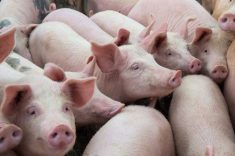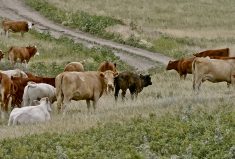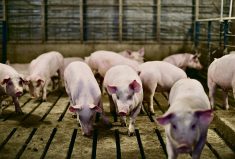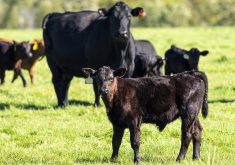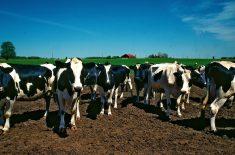Glacier FarmMedia – In the last three years, the African swine fever virus has killed millions of pigs and forced producers to cull tens of millions of pigs in China, Vietnam, Eastern Europe and elsewhere.
In late July, the deadly virus was detected in the Dominican Republic, the first time it’s been in the Americas in four decades.
Why it matters: ASF can kill 50 to 100 per cent of pigs in an infected barn, and an outbreak in North America could cause economic losses of US$5 to $7 billion annually, based on United States Department of Agriculture estimates.
Read Also

Dissolving eartags could make pig traceability easier
A dissolving eartag for market hogs, called Clean Trace could reduce processing challenges and enable more individual management of pigs.
The virus is extremely hardy, as it can survive in dead animal carcasses. It can also persist for weeks or months in uncooked meats, cured meats or contaminated clothing, allowing the disease to cross borders.
It’s likely that ASF will eventually move from the Caribbean to the U.S. and Canada, so it seems logical that North America’s pork industry needs a vaccine that will prevent the disease in pigs.
But a vaccine for ASF may not make sense for several reasons:
- Designing a vaccine that’s effective on all ASF variants and evolving variants is challenging;
- It may make more sense to cull pigs rather than treat them with a vaccine;
- A vaccine could disrupt exports of Canadian pork.
“The virus is so variable that we can’t design a vaccine for all the genotypes, with all the variants,” said Matheus Costa, a swine health expert at the Western College of Veterinary Medicine in Saskatoon.
Plus, much like COVID-19, ASF continues to change and new variants emerge. That means a vaccine, developed this summer, may be less effective on a variant that appears in the fall.
“Think about this with the (COVID-19) Delta variant. It’s the same thing,” Costa said.
There is also the nature of the ASF virus.
It moves slowly from pig to pig and containing the virus by culling the local population might be the most effective control strategy.
“Because it doesn’t move quickly we’re able to fence it off within a barn. You can have African swine fever in your barn and keep it in one, single room… if you have good biosecurity,” Costa said. “(But) eventually, someone forgets about a dirty boot or something and then moves onto another room. Because it (the virus) is so hardy.”
If hog producers around the infected barn have vaccinated their herds, it would offer some protection and fewer pigs would die. But the virus would still be in that geographic location.
That’s problematic because ASF is lethal and it would be impossible to continue trade of pigs from that area. Nobody would want to buy pigs or pork from the region.
“That’s why it’s not commercially attractive. It’s better to cull all your pigs and get rid of the virus,” Costa said. “It’s just too risky to have the virus around the neighbourhood. It’s just so lethal and it’s so costly, you’re better off de-populating and being ASF-free.”
Vaccines can also disrupt trade in another manner. They prompt the body to produce antibodies that fight off the virus. But pigs that survive ASF also produce antibodies. That creates confusion for buyers of Canadian pork, who may wonder if Canada has ASF or not.
“If we start using a non-marker vaccine in Canada… when we do blood testing on those pigs, we can’t tell if that pig has antibodies because of exposure to the virus, or if those antibodies were generated from the vaccine,” said Egan Brockhoff, veterinary counselor with the Canadian Pork Council.
A marker in a vaccine is a signature, identifying a specific immune response. If the ASF vaccine doesn’t have such a marker, commercial pig producers in Canada would be reluctant to use the vaccine.
“Because Canada wants to resume trade of pork products as soon as possible (after an ASF detection), vaccination could complicate things. That’s a really big obstacle,” Brockhoff said.
While vaccination may be a poor fit for ASF, companies and countries continue to work on vaccines. A government agency in Vietnam has developed a vaccine and trials have shown that it is 95 per cent effective. The USDA is also making progress.
Ultimately, those vaccines could prove to be effective in a commercial herd.
Canadian hog producers may eventually use those vaccines, because ASF is coming to Canada, Costa said.
“Yep. It’s probably not a matter of if. It’s probably a matter of when…. And are we going to identify it, fast enough?”
This article was originally published at The Western Producer.





